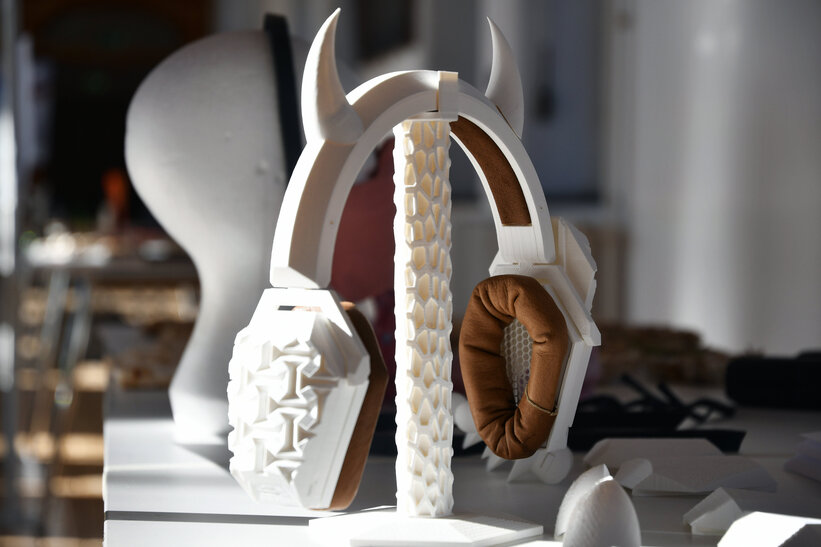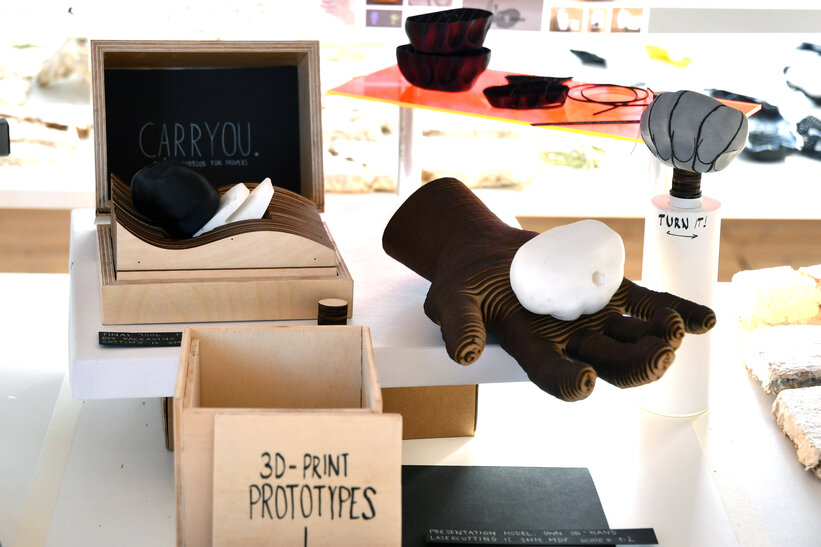Advanced Prototyping
IO-MI-221
How would you go about designing and prototyping a personalized fit bicycle helmet? And how can you use extended reality technology (e.g. VR) to convincingly convey the sense of interacting with a priceless cultural heritage artifact?
In the Minor Advanced Prototyping you will design and build functional, low and high-fidelity prototypes, utilizing and showcasing the unique opportunities of digital fabrication and virtual and/or augmented reality technology (new topic, pending approval). The course aims at equipping you with a wide range of advanced prototyping skills and in-depth knowledge of current state-of-the-art techniques to create prototypes which capture both function and appearance of the intended design.
Have a look at an impression of the results of one of the courses in Q1, and of the results of the projects in Q2 of 2021/2022, and the results of one of the courses in Q1 of 2022/2023.
Faculty of Industrial Design Engineering
ECs: 30
Language: English
Maximum participants: 45
| Non-selection minor: | |
| Selection minor: | |
| Education period(s): Q1 & Q2 | |
For whom?
Advanced Prototyping Minor suits both design-oriented students with science/ technology background and ‘science/technology’ oriented students with art/design background. The aim is to build project groups by combining students from these different backgrounds to create an environment in which students can reflect on the contribution of each discipline for advanced prototyping.
Selection takes place by means of a random draw, based on the following formula:
- 1/2 from Industrial Design Engineering
- 1/2 from other Technical/Engineering disciplines
This allocation is done to meet the interdisciplinary nature of the minor.
Minors of the faculty of Industrial Design Engineering are open only for students from academic programmes.
What will you learn?
In Q1 two courses “Prototyping with/for Digital Fabrication” (PDF), and “Prototyping with/for Extended Reality” run in parallel. These emphasise the role of these digital technologies in prototyping advanced responsive, adaptive and/or ultra-personalised prototypes (i.e., prototyping with), and the role of prototyping for showing the potential of these visualization (and fabrication) technologies (i.e., prototyping for).
In the “Prototyping with/for Digital Fabrication” (PDF) course, you will be learn about theories, methods, and techniques on digitalisation, design automation, and digital fabrication. Learning activities will include lectures and workshops on 3D scanning, 3D modelling and parametric design tools (Rhino Grasshopper), generative design (e.g. topology optimization), and digital fabrication technologies like 3D printing, laser cutting, and CNC milling. You will apply the knowledge and skills obtained on these topics in an individual prototyping assignment, related to designing and prototyping a ‘personalized fit’ tool or wearable.
In the “Prototyping with/for Extended Reality” (PER) course, we will introduce you to extended reality technology, and explore how you might develop virtual and/or mixed reality applications of the future (e.g. using VR headsets). Learning activities will include lectures and tutorials on material experience, human-computer interaction, and XR development (Unreal Engine). You will apply the knowledge and skills on these topics, in an assignment carried out in a (small) group, revolving around the augmentation of a cultural heritage artefact.
In Q2, the acquired knowledge and skills of PDF and PER will be deepened in the Advanced Prototyping Project (APP). In this group project, you build (multiple) prototype(s) through an iterative (and parallel) prototyping approach. You will test and evaluate your prototypes, and eventually exhibit both the results of your prototyping process and your final prototype(s) in a public location. The course allows you to choose a project from a wide range of ""real-world"" cases (with a company/research client), related to digital fabrication and/or extended reality technology. In the APP course you will also gain experience, through hand-on workshops, with various relevant design methods and transferable skills, such as ‘team dynamics, 'interview techniques', 'material testing', 'product photography', and 'video making'.
Course overview
-
- IO3850 – Prototyping with/for Digital Fabrication (10EC)
- IO3851 – Prototyping with/for Extended Reality (5EC) -
- IO3852 – Advanced Prototyping Project (15EC)
-
We offer instructions through lectures, workshops, and (self-paced) tutorials. You will apply knowledge and skills in 1 individual (PDF, Q1), in a small group (PER, Q1), and 1 group project (Q2), where you will receive project-focused coaching. The outcomes of the individual/group assignment (e.g. deliverables such as prototypes, report, exhibition/video), and for PDF/APP complemented with a personal reflection, are summatively assessed using an assessment rubric.
Number of contact hours: Q1: 24 hours (average), Q2: 10 hours.
Modes of instruction:
Q1: Lectures (10 hours), workshops/practicals (14 hours), project work/self study (16 hours).
Q2: Workshops (6 hours), coaching (2 hours), project work/self study (32 hours).
Notes:- This minor is a full-time program, and the experience of students from previous years learns it also requires full-time availability Monday-Friday, on weekdays.
- The courses are all taught in English.
- These courses are an integral part of the minor, and cannot be followed as separate courses, due to the limited capacity.
-
You can register here: Minors.
Note that these courses are an integral part of the minor, and cannot be followed as separate courses, due to the limited capacity.
Contact

Willemijn Elkhuizen
- w.s.elkhuizen@tudelft.nl
- TU Delft profile
-
Room 32-B-3-220
"One must work and dare if one really wants to live."





